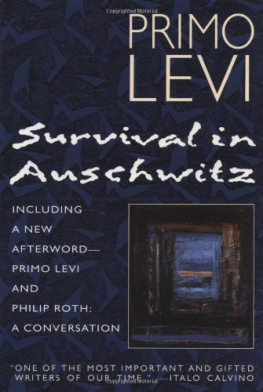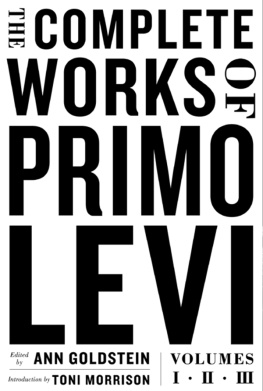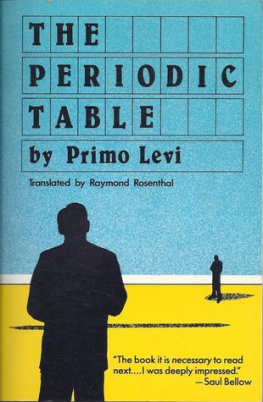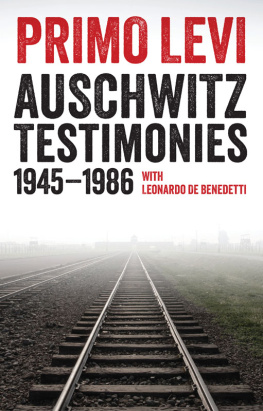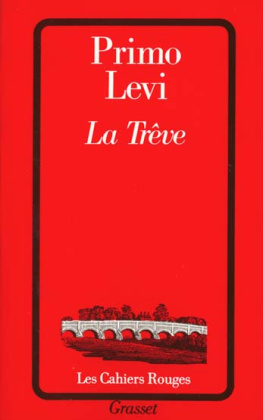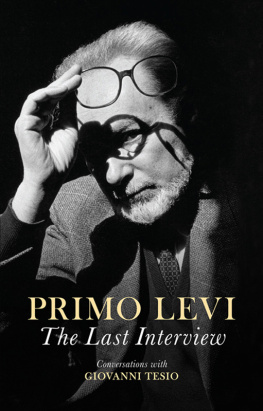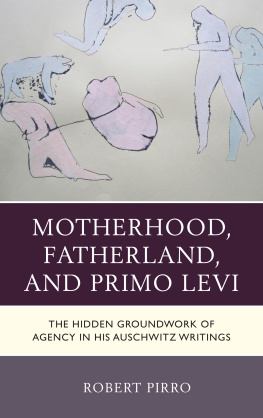1. The Journey
I was captured by the Fascist Militia on 13 December 1943.1 was twenty-four, with little wisdom, no experience and a decided tendency encouraged by the life of segregation forced on me for the previous four years by the racial laws to live in an unrealistic world of my own, a world inhabited by civilized Cartesian phantoms, by sincere male and bloodless female friendships. I cultivated a moderate and abstract sense of rebellion.
It had been by no means easy to flee into the mountains and to help set up what, both in my opinion and in that of friends little more experienced than myself, should have become a partisan band affiliated with the Resistance movement Justice and Liberty. Contacts, arms, money and the experience needed to acquire them were all missing. We lacked capable men, and instead we were swamped by a deluge of outcasts, in good or bad faith, who came from the plain in search of a non-existent military or political organization, of arms, or merely of protection, a hiding place, a fire, a pair of shoes.
At that time I had not yet been taught the doctrine I was later to learn so hurriedly in the Lager: that man is bound to pursue his own ends by all possible means, while he who errs but once pays dearly. So that I can only consider the following sequence of events justified. Three Fascist Militia companies, which had set out in the night to surprise a much more powerful and dangerous band than ours, broke into our refuge one spectral snowy dawn and took me down to the valley as a suspect person.
During the interrogations that followed, I preferred to admit my status of Italian citizen of Jewish race. I felt that otherwise I would be unable to justify my presence in places too secluded even for an evacuee; while I believed (wrongly as was subsequently seen) that the admission of my political activity would have meant torture and certain death. As a Jew, I was sent to Fossoli, near Modena, where a vast detention camp, originally meant for English and American prisoners-of-war, collected all the numerous categories of people not approved of by the new-born Fascist Republic.
At the moment of my arrival, that is, at the end of January 1944, there were about one hundred and fifty Italian Jews in the camp, but within a few weeks their number rose to over six hundred. For the most part they consisted of entire families captured by the Fascists or Nazis through their imprudence or following secret accusations. A few had given themselves up spontaneously, reduced to desperation by the vagabond life, or because they lacked the means to survive, or to avoid separation from a captured relation, or even absurdly to be in conformity with the law. There were also about a hundred Jugoslavian military internees and a few other foreigners who were politically suspect.
The arrival of a squad of German SS men should have made even the optimists doubtful; but we still managed to interpret the novelty in various ways without drawing the most obvious conclusions. Thus, despite everything, the announcement of the deportation caught us all unawares.
On 20 February, the Germans had inspected the camp with care and had publicly and loudly upbraided the Italian commissar for the defective organization of the kitchen service and for the scarce amount of wood distribution for heating; they even said that an infirmary would soon be opened. But on the morning of the 21st we learned that on the following day the Jews would be leaving. All the Jews, without exception. Even the children, even the old, even the ill. Our destination? Nobody knew. We should be prepared for a fortnight of travel. For every person missing at the roll-call, ten would be shot.
Only a minority of ingenuous and deluded souls continued to hope; we others had often spoken with the Polish and Croat refugees and we knew what departure meant.
For people condemned to death, tradition prescribes an austere ceremony, calculated to emphasize that all passions and anger have died down, and that the act of justice represents only a sad duty towards society which moves even the executioner to pity for the victim. Thus the condemned man is shielded from all external cares, he is granted solitude and, should he want it, spiritual comfort; in short, care is taken that he should feel around him neither hatred nor arbitrariness, only necessity and justice, and by means of punishment, pardon.
But to us this was not granted, for we were many and time was short. And in any case, what had we to repent, for what crime did we need pardon? The Italian commissar accordingly decreed that all services should continue to function until the final notice: the kitchens remained open, the corvees for cleaning worked as usual, and even the teachers of the little school gave lessons until the evening, as on other days. But that evening the children were given no homework.
And night came, and it was such a night that one knew that human eyes would not witness it and survive. Everyone felt this: not one of the guards, neither Italian nor German, had the courage to come and see what men do when they know they have to die.
All took leave from life in the manner which most suited them. Some praying, some deliberately drunk, others lustfully intoxicated for the last time. But the mothers stayed up to prepare the food for the journey with tender care, and washed their children and packed the luggage; and at dawn the barbed wire was full of childrens washing hung out in the wind to dry. Nor did they forget the diapers, the toys, the cushions and the hundred other small things which mothers remember and which children always need. Would you not do the same? If you and your child were going to be killed tomorrow, would you not give him to eat today?
In hut 6A old Gattegno lived with his wife and numerous children and grandchildren and his sons- and daughters-in-law. All the men were carpenters; they had come from Tripoli after many long journeys, and had always carried with them the tools of their trade, their kitchen utensils and their accordions and violins to play and dance to after the days work. They were happy and pious folk. Their women were the first to silently and rapidly finish the preparations for the journey in order to have time for mourning. When all was ready, the food cooked, the bundles tied together, they unloosened their hair, took off their shoes, placed the Yahrzeit candles on the ground and lit them according to the customs of their fathers, and sat on the bare soil in a circle for the lamentations, praying and weeping all the night. We collected in a group in front of their door, and we experienced within ourselves a grief that was new for us, the ancient grief of the people that has no land, the grief without hope of the exodus which is renewed every century.
Dawn came on us like a betrayer; it seemed as though the new sun rose as an ally of our enemies to assist in our destruction. The different emotions that overcame us, of resignation, of futile rebellion, of religious abandon, of fear, of despair, now joined together after a sleepless night in a collective, uncontrolled panic. The time for meditation, the time for decision was over, and all reason dissolved into a tumult, across which flashed the happy memories of our homes, still so near in time and space, as painful as the thrusts of a sword.
Many things were then said and done among us; but of these it is better that there remain no memory.
With the absurd precision to which we later had to accustom ourselves, the Germans held the roll-call. At the end the officer asked Wieviel Stck? The corporal saluted smartly and replied that there were six hundred and fifty pieces and that all was in order. They then loaded us on to the buses and took us to the station of Carpi. Here the train was waiting for us, with our escort for the journey. Here we received the first blows: and it was so new and senseless that we felt no pain, neither in body nor in spirit. Only a profound amazement: how can one hit a man without anger?

